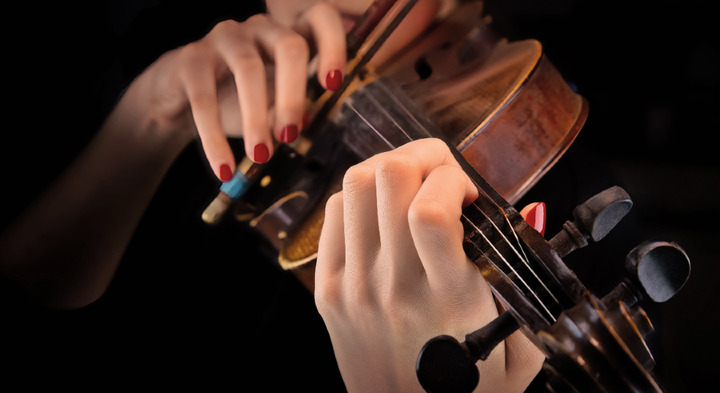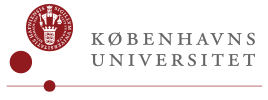Physical exercise boosts motor learning – and remembering what one has learned
Violinists, surgeons and gamers can benefit from physical exercise both before and after practicing their new skills. The same holds true for anyone seeking to improve their fine motor skills. This is demonstrated by new research from the University of Copenhagen, which, among other things, can make the way we rehabilitate more effective.

Before a violinist tunes their instrument or surgeon stands at the training table to learn the skills needed for a new symphony or surgical procedure, they might consider heading out for a bike ride or run. Once they’ve practiced the new skill, there’s good reason to put on their workout attire again.
Indeed, being physically active and elevating one’s heart rate has the wonderful side effect of improving our ability to learn by increasing the brain's ability to remember.
In a new study, researchers from the Department of Nutrition, Exercise and Sports have shown that this effect also applies to the formation of motor memory, enabling us to recall and perform tasks such as riding a bike, drive a car and lace up our shoes, almost automatically.
Before or after is good, both are best
"Our results demonstrate that there is a clear effect across the board. If you exercise before learning a skill, you will improve and remember what you have learned better. The same applies if you exercise after learning. But our research shows that the greatest effect is achieved if you exercise both before and after," says PhD Lasse Jespersen, first author of the study.
Specifically, the researchers see around 10% improvement in people’s ability to remember a learned motor skills when exercise is included either before or after an exercise. And, the effect can be enhanced by exercising at both times.
"Things can’t go wrong if a bit of physical exercise is incorporated. A person will experience beneficial effects. This is probably because physical activity increases the brain's ability to change, which is a prerequisite for remembering," explains co-author Jesper Lundbye-Jensen, who heads the department's Movement and Neuroscience section.
The effect applies to everyone, including children, adolescents and older adults, but in particular, anyone who regularly needs to learn new skills. Moreover, the effects may hold significance for individuals undergoing rehabilitation, aiming to recover mobility and lost motor skills.
Gamers and musicians excluded
Sixty-seven test subjects were involved in the research project. To ensure for comparable data, all subjects were young men between the ages of 18 and 35 who were not physically or mentally impaired in ways that could limit their learning ability and physical performance.
The researchers examined the subjects' behaviour and performance while reviewing one of four possible scenarios.
First, they either rested or exercised moderately on a bicycle. After that, they were subjected to a fine motor task in the form of a simple computer game that, with a small device on their fingertips, challenged and practiced the participants' motor dexterity.
Next, they either had to exercise intensely on a fitness bike or rest. Thus, there was one group that rested both before and after, one that trained both times and two that trained once, either before or after. Their skill level and memory were tested again after seven days to assess whether what they had learned stuck.
As a somewhat unusual criterion, professional musicians and gamers were excluded as possible participants.
"People with extensive experience in practicing motor skills typically start at a different level. While the motor task used in the research study were unknown to all, involving experts would have changed the dynamic from the get go. But that doesn't mean they wouldn't benefit from the effects we've shown. To the contrary, in a future study, it could be exciting to investigate how exercise affects people with elite level fine motor skills," says Lasse Jespersen.
Helping hand for those rehabilitating
The increased effect of motor learning is something everyone can benefit from. Children who are developing their motor skills are often highlighted, and previous studies with pianists have already shown that people with extraordinary motor skills also benefit from exercise.
At the other end of the spectrum, the new knowledge could make an important contribution as well. For example, among those needing to regain mobility after an accident.
"Typically, rehabilitation is divided between two or three different disciplines. In practice, this may mean that Mr. Smith will have physical training with a physiotherapist on one day, work with an ergonomist the next and train cognitive abilities with a psychologist on the third. Our research suggests that it could be wise to plan rehabilitation so that these areas are considered together, as doing so could have a synergistic effect," explains Jesper Lundbye-Jensen, who points out:
"Coming back often entails hard work, and even slight improvements in efficiency can mean a lot to people in that situation."
In the long term, the researchers hope to be able to provide such recommendations with more ammunition for a long-term study where more lasting effects can be measured. A longer-term study would also let the researchers investigate whether the effects observed by the study become even greater over a longer trial period.
*
Extra info: This is what happens physiologically
Specific parts of the brain are activated when a person engages in motor practice that require the acquisition of fine motor skills.
If the task is an activity that one knows well, like riding a bicycle, the centers are less active, but that all changes when learning something new.
The brain undergoes actual changes which is essential for our ability to learn and remember new skills, a phenomenon known as brain plasticity. These changes occur both while the new skill is acquired through practice, but also in the hours after when the memory is consolidated. This is why it is meaningful to be physically active even after we've engaged in something new.
"In the study, we use the terms online and offline to describe these two aspects of learning – memory acquisition and retention. Both are important for us to acquire new motor skills and remember what we’ve learned," Jesper Lundbye-Jensen explains.
Previous studies have also shown that physical exercise releases a number of neurotransmitters that have the side benefit of promoting the development in the brain that new learning has initiated. The researchers believe that this is the relationship that produces the beneficial effects.
Facts: About the study:
67 men between the ages of 18-35 participated in the studies.
A behavioural study, where results were studied across 4 groups with different behaviours. No blood tests, brain activity or genetics were used.
- group trained at moderate intensity before engaging in fine motor practice, but rested afterwards.
- group rested before the motor practice, but exercised intensely thereafter.
- group trained both prior to and after motor practice.
- group was the control group, and rested both before and after.
(Previous studies have shown that intense exercise before can negatively affect results, while intense workout afterwards have the best effect.)
Facts: Measured performance in two dimensions
The researchers examined two dimensions of performance.
- Development of the skill level during motor practice (online)
- Maintaining skill levels when repeating the task after a 7-day break (offline)
Behind the research
From the Department of Exercise and Nutrition, University of Copenhagen:
Lasse Jespersen
Katrine Matlok Maes
Nicoline Ardenkjær-Skinnerup
Jonas Rud Bjørndal
Jesper Lundbye-Jensen
and Mikkel Malling Beck - also affiliated with the MR Research Center (DRMCR), Hvidovre Hospital
Additionally:
Marc Roig from the Memory and Motor Rehabilitation Laboratory, Feil and Oberfeld Research Centre, Canada and the School of Physical and Occupational Therapy, McGill University, Canada
Keywords
Contacts
Lasse JespersenPhDMovement and Neuroscience, Department of Nutrition, Exercise and Sports, University of Copenhagen
Tel:+ 45 35326133lje@nexs.ku.dkJesper Lundbye-JensenAssociate Professor, Head of SectionMovement and Neuroscience, Department of Nutrition, Exercise and Sports, University of Copenhagen
Tel:+ 45 35327330jlundbye@nexs.ku.dkKristian Bjørn-HansenJournalist and Press ContactFaculty of Science, Copenhagen University
Tel:+45 93516002kbh@science.ku.dkLinks
ABOUT THE FACULTY OF SCIENCE
The Faculty of Science at the University of Copenhagen – or SCIENCE – is Denmark's largest science research and education institution.
The Faculty's most important task is to contribute to solving the major challenges facing the rapidly changing world with increased pressure on, among other things, natural resources and significant climate change, both nationally and globally.
Subscribe to releases from Københavns Universitet
Subscribe to all the latest releases from Københavns Universitet by registering your e-mail address below. You can unsubscribe at any time.
Latest releases from Københavns Universitet
Fra Stevns til Månen: Dansk-ledet rummission skal kortlægge Månens overflade17.12.2025 06:00:00 CET | Pressemeddelelse
Københavns Universitet skal stå i spidsen for den første danske månemission. Missionen skal kortlægge Månens overflade i hidtil uset detaljegrad, som skal gøre det sikkert at lande og etablere baser på Månen i fremtiden.
Your Christmas decorations may be hiding a tiny bit of badger and toad16.12.2025 09:27:05 CET | Press release
Researchers at the University of Copenhagen have discovered that moss acts as a natural trap for environmental DNA. This discovery opens the door to using moss as a simple, gentle and inexpensive method of monitoring biodiversity – from birds and mammals to fungi, insects and microbes.
Din juledekoration gemmer måske på en lillebitte smule grævling og skrubtudse16.12.2025 09:17:58 CET | Pressemeddelelse
Forskere fra Københavns Universitet har opdaget, at mos fungerer som en DNA-fælde i naturen. Og den opdagelse åbner for mos som en enkel, billig og skånsom metode til at holde øje med biodiversiteten – fra fugle og pattedyr til svampe, insekter og mikrober.
Forskere genopliver gamle ærtesorter i enorm frøsamling: ”Et uudnyttet guldkammer til fremtiden”15.12.2025 10:29:09 CET | Pressemeddelelse
Med en ny AI-metode har forskere fra Københavns Universitet genopdaget 51 gamle ærtesorter, som ikke længere bruges i landbruget, men som kan vise sig lovende til produktion af plantebaserede fødevarer. Metoden er en genvej til at finde nye ressourcer i de grønne skatkamre, som genbankers enorme frøsamlinger udgør.
Fermentering gør havets grøntsager mere spiselige5.12.2025 06:18:59 CET | Pressemeddelelse
Tang har længe været hyldet som en bæredygtig superingrediens – men dens “fiskede” smag er en barriere for mange vestlige forbrugere. Nu viser et nyt studie fra Københavns Universitet, at fermentering med mælkesyrebakterier kan være nøglen til at få tangen til at glide ned.
In our pressroom you can read all our latest releases, find our press contacts, images, documents and other relevant information about us.
Visit our pressroom